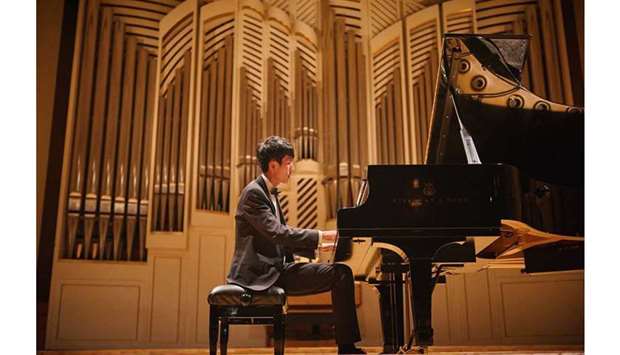Qatar Philharmonic Orchestra (QPO) has been offering the best western classical music for orchestra music lovers in Doha for the last 12 years. They have been consolidating fame world over with frequent concerts and hosting well-known conductors and musicians from different countries.
In its ongoing season, QPO’s next concert ‘Sibelius Symphony No. 2’ will be held at Auditorium 3 of Qatar National Convention Centre tomorrow (December 14) at 7:30pm. The performance will be conducted by Chinese conductor Renchang Fu. Eric Lu, a Chinese-American musician will be at piano.
In the first half of the concert, the orchestra will present Pyotr Ilyich Tchaikovsky’s Piano Concerto No. 1 in B-flat Minor, Op. 23 symphony. In the second half, the audience will listen to Jean Sibelius’ Symphony No. 2 in D Major, Op. 43.
First Piano Concerto of Tchaikovsky is a composition of stature in piano literature, holding a position of proud significance in the repertoire of the instrument — enough, perhaps, to create a platform for just such an historical performance.
The piano, or its musical predecessors, was often the chosen medium — with names such as Bach, Mozart, Beethoven, Liszt, Schumann, Chopin, Rachmaninoff and Debussy favouring the instrument.
A new generation has sought to make itself heard, led by pianists such as Evgeny Kissin and Lang Lang. But under them lies a younger generation still.
The Pianist Magazine has appointed five pianists to look out for in 2019, and Eric Lu tops the list. Eric Lu will perform with the orchestra under the baton of Renchang Fu.
The artistic director and principal conductor of Xiamen Philharmonic Orchestra, Fu studied conducting in Shanghai, Berlin and Leipzig from 1989 to 2000. In 2000, he was offered a certificate of Meisterklassenexamen from the College for Music and Theater Felix Mendelssohn Bartholdy – Leipzig. In 1993, he won a prize in the first competition for conducting in China.
Always a welcome conductor, Fu has conducted numerous orchestras in Europe, America, Asia and Oceania. He has a very wide repertoire from Baroque to contemporary music.
He has conducted some Chinese premieres of Western classical music in China, and has also premiered a number of contemporary music pieces at different music festivals at home and abroad.
Twenty-one-year old pianist Lu is rapidly building an international reputation as a young pianist with enormous promise and a distinctive musical voice.
A native of Boston, Lu is the first prize winner of the 2015 US National Chopin Competition in Miami, where he also received The Best Concerto Prize.
In October 2015, at the age of 17, Lu won the fourth prize at the 17th International Fryderyk Chopin Competition in Warsaw, becoming one of the youngest laureates in the history of the competition.
Earlier achievements include first prizes at the Moscow International Chopin Competition for Young Pianists (2014), the Minnesota International Piano Junior Competition (2013), and the XII Ettlingen International Competition in Germany (2010).
He was described by the New York Classical Review as a musician of “exceptional musical sensitivity”, as well as proclaimed by Michael Moran from the Duszniki Festival, “The tone he produced was luminous, the articulation spellbinding and exciting, the legato and bel canto desperately moving.”
Pyotr Ilyich Tchaikovsky (1840-1893) was a major Russian composer of the late 19th century. A key figure of Russian Romanticism and the first Russian composer to receive international acclaim, he was one of the great symphonists of his generation.
Particularly gifted for melodies and a master of lyricism and sentimentality, Tchaikovsky composed some of the most popular themes in all of classical music.
Herbert von Karajan, a noted Austrian conductor, described Sibelius’ music (1865-1957) as “out of this world,” and the importance he accorded to it is such that he insisted that Sibelius’ Fourth Symphony would feature on the programme of his first concert with the Berliner Philharmonic.
He is undoubtedly one who best understood and interpreted the music of the Finnish, relatively unfamiliar composer.
Sibelius had a teeming life, rich in travel and in encounters with artiests such as Claude Debussy and Gustav Mahler among many others.
Born to post-Romanticism and to the end of the 19th century, he experienced the emerging musical modernity, the birth of contemporary music and atonality which left him sceptical.

RISING STAR: Eric Lu, a Chinese-American musician will perform at Qatar Philharmonic Orchestra’s next concert.
